必修5unit1Reading
牛津译林版英语高二上学期英语必修五Unit1知识点梳理
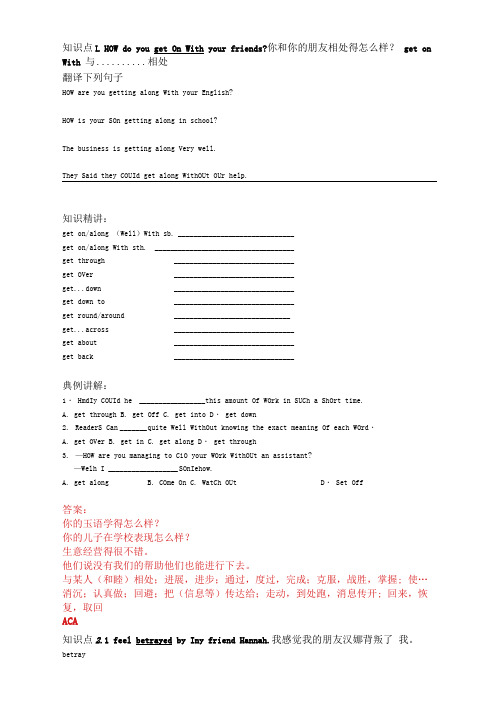
知识点L HOW do you get On With your friends?你和你的朋友相处得怎么样?get on With 与.......... 相处翻译下列句子HOW are you getting along With your English?HOW is your SOn getting along in school?The business is getting along Very well.They Said they COUId get along WithOUt OUr help.知识精讲:get on/along (Well)With sb. ______________________________get on/along With sth. ____________________________________get through _______________________________get OVer _______________________________get...down _______________________________get down to _______________________________get round/around ______________________________get...across _______________________________get about _______________________________get back _______________________________典例讲解:1・ HmdIy COUId he _________________ t his amount Of WOrk in SUCh a ShOrt time.A. get throughB. get OffC. get into D・ get down2.ReaderS Can _______ q uite Well WithOut knowing the exact meaning Of each WOrd・A. get OVerB. get inC. get along D・ get through3.—HOW are you managing to CiO your WOrk WithOUt an assistant?—Welh I __________________ SOnIehow.A. get alongB. COme OnC. WatCh OUt D・ Set Off答案:你的玉语学得怎么样?你的儿子在学校表现怎么样?生意经营得很不错。
高中英语必修5单词表Unit 1

高中英语必修5单词表Unit 1 高中英语必修5单词表Unit 11. characteristic n. 特征;特性2. radium n. 镭3. painter n. 画家;油漆匠4. *put forward 提出5. scientific adj. 科学的6. *conclude v.完毕7. conclusion n.结论8. *draw a conclusion得出结论9. analyse v.分析10. infect v.传染11. infectious adj.传染的12. defeat v. 打败13. expert adj.熟练的 n. 专家14. *attend v.照顾15. physician n.医生16. *expose v.暴露17. *expose...to使显露18. deadly adj.致命的19. *cure n.治愈 cure sb of sth20. outbreak n.爆发21. *challenge n.挑战22. victim n.受害者23. absorb v.吸收24. *suspect v.疑心25. inquiry n.询问26. neighbourhood n.附近 neighborhood27. severe adj.严重的28. clue n.线索29. pump n.泵30. foresee v.预见---foresaw-foreseen31. investigate v.调查32. investigation n.调查33. *blame v.责备34. *pollute v.污染35. *handle n.柄36. germ n.微生物37. *link v.连接38. *link...to... 将…和…联系或连接起来39. *announce n.宣布 announcement n. 宣布40. certainty n.确信41. instruct v.命令 instruction n. 指示;指令 construct v. 建立;建造 construction n. 建立42. responsible adj.有责任的` irresponsible adj. 不负责责任的responsibility n. 责任43. construct v.建立44. construction n.建立45. *contribute v.捐献 to doing sth. make contributions to doing sth46. *apart from 除……之外47. firework n.烟火48. chart n.图表49. creative adj.有创造力的 creativity n. 创造力creation n. 创造create v.创造50. co-operative adj.合作的 co-operation n. 合作51. positive adj.积极的 neutral adj. 中立的 negative adj. 的52. *(be) strict with sb.对……严格的 be strict in sth 在某方面要求严格53. revolutionary adj.革命的 revolution n. 革命54. movement n.移动55. *make sense讲得通56. backward adj.向后的57. loop n.圈58. privately adv.私下地59. *spin v.(使)旋转---spun---spun60. brightness n.明亮 bright adj.61. enthusiastic adj.热情的 enthusiasm n.热情 be enthusiastic about sb/sth 对……充满热情62. cautious adj.小心的---caution n. 小心63. *reject v.回绝64. universe n.宇宙---universal adj. 普遍的;宇宙的。
必修5_Unit1_Art---Reading

2. At first most people hated the impressionists’ style of painting, because _____. A. their painting were very abstract. B. their painting were very realistic. C. They broke away from the traditional style of painting. D. their paintings were very ridiculous.
4. ____discovered how to make paintings look more real by
using perspective.
A. Giotto di Bondone. B. Masaccio.
C. Claude Monet.
D. Pablo Picasso
5. What does the text mainly tell us? A.How religious painting
Raffael (1483-1520) 拉斐尔
The School of Athens 《雅典学院》
Masaccio(1401-1427), the first great painter of the Italian Renaissance, who discovered perspective in painting.
art
It makes the environment beautiful and our life colorful!
paintings sculptures buildings
Pair work
新课标高中英语必修5 课文翻译与要点 unit1
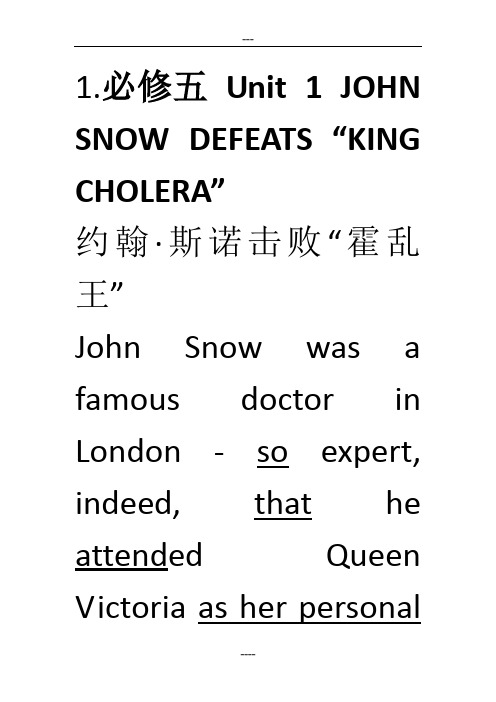
1.必修五Unit 1 JOHN SNOW DEFEATS “KING CHOLERA”约翰·斯诺击败“霍乱王”John Snow was a famous doctor in London - so expert, indeed, that he attended Queen Victoria as her personalphysician.约翰·斯诺是伦敦一位著名的医生——他的确医术精湛,因而成为照料维多利亚女王的私人医生。
But he became inspired when he thought about helping ordinary people exposed to cholera.但他一想到要帮助那些得了霍乱的普通百姓时,他就感到很振奋。
This was the deadly disease of its day.霍乱在当时是最致命的疾病,Neither its cause nor its cure was understood.人们既不知道它的病源,也不了解它的治疗方法。
So many thousands of terrified people diedevery time there was an outbreak.每次霍乱暴发时,就有大批惊恐的老百姓死去。
John Snow wanted to face the challenge and solve this problem.约翰·斯诺想面对这个挑战,解决这个问题。
He knew that cholera would never be controlled until itscause was found.他知道,在找到病源之前,霍乱疫情是无法控制的。
He became interested in two theories that possibly explained how cholera killed people.斯诺对霍乱致人死地的两种推测都很感兴趣。
人教必修5 Unit 1 Great Scientists John Snow Defeats “King Cholera”
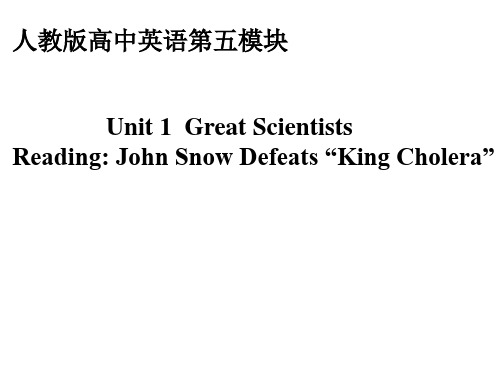
A woman and her daughter who lived far away but drank find supporting evidence two __________ Para 6 What other deaths analyse the results extra evidence did he find? the water also died.
Many thousands of terrified people died of cholera.
What method did he use? pub
ManyA deaths happened here. map of Broad
No deaths happened here
?
St worked in the pub had been given free beer and so had not drunk the water from the pump.
It seemed the water from the pump was to blame.
Further thinking :
1. Do you think John Snow would have solved this problem without the map? Give your reasons.
Father of Modern Genetics
Guess
Who? When? Where?
What?
John Snow Defeats “King Cholera”
Prediction: The passage mainly tells us how he gathered information, analyzed the valuable ___________________________________________ ____________________________________________. clue, found out the cause of cholera and defeated it
牛津译林版高中英语必修5Unit 1Getting along with othersReading课件148张PPT课件ppt
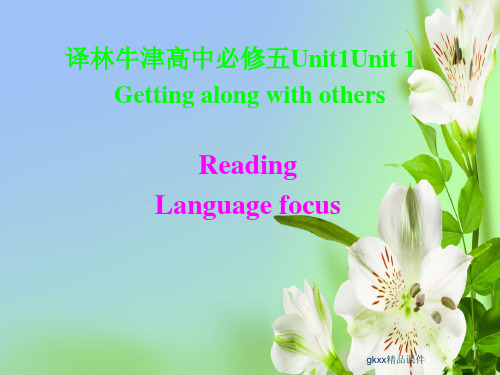
1. We have been good friends since primary
school. (line7)
(prep.)
(1). Unemployment in that country is now at its lowest level since WWII.该国的失业率 处于二战以来的最低水平。
2). I write not just for the pay, but for fun.(乐趣). We had a lot of fun at the party.
3). They often make fun of me for this.
gkxx精品课件
Don’t make_____of the blind man. A. fun B. funs C. funny D. a fun fun 做名词时不可数, 不能与a连用,也没 有复数形式。
park.
我们想要一
个能居高临下看到花园而不是停车场的房
间。
gkxx精品课件
6.I was determined to be cheerful.(line14)
(1) adj. 下了决心的
a. He is determined to take part in the international speech competition.
gkxx精品课件
(2). may have done (it’s not certain) Something may have happened to her. 可能她发生了什么事。
4. feel like (have a desire for) (line11-12)
gkxx精品课件
2021牛津译林版必修五unit 1《getting along with others》(read

2021牛津译林版必修五unit 1《getting along with others》(reading)word教案教案-R e a d i n g(译林牛津版必修5)Reading---教案Objectives:1.To help Ss get a general idea about the text.2. To make Ss become familiar with the detailed information about the text.3. To help Ss master Reading Strategy.Teaching important point:1.How to make the students understand the passage better.2.How to help the students finish all the exercises.3.How to help the students develop their creative, comprehensive and consolidating abilities. Interaction Patterns: Teachers -class, individuals, pairsProcedures for teaching:Step 1 lead-inDiscussion● 1. Do you have any important events or unforgettable experiences with your close friends?● 2. Please share something with us and tell us what to do when meeting with difficulties in friendship.(1). If your friend tells others about your secrets, how will you feel and what will you react?(2). When your friendship is in trouble,will you stop talking with your friend and make a new friend?Conclusion● 1. We should keep our promise and keep friends’secrets. Honesty is one of the most important factors in the friendship.● 2. Friends should unite and help each other when meeting with some difficulties both in study or in other fields of life.In other words, we are supposed to take honesty and union as glory. But what are the shameful behaviors or the glorious?Next let’s learn something about it.●以热爱祖国为荣以危害祖国为耻●以服务人民为荣以背离人民为耻●以崇尚科学为荣以愚昧无知为耻●以辛勤劳动为荣以好逸恶劳为耻●以团结互助为荣以损人利己为耻●以诚实守信为荣以见利忘义为耻●以遵纪守法为荣以违法乱纪为耻●以困难奋斗为荣以骄奢淫逸为耻Step 2 Comprehension of the textFirst reading●By using these two rules, let’s go over the two letters for the first time and try to answer questions below.1. What did Sarah think about the surprise Maths test?She thought it was quite easy.2. What did Sarah tell Hannah in the girls’ toilet?She told Hannah how badly she had done in the Maths test.3. Why did Sarah tell Hannah that they weren’t going to be friends any more?Because she thought that Hannah had told everyone how badly she had done in the Maths test.4. Why did Andrew shout at Matthew after the match?He thought Matthew played badly and did not try hard enough. As a result, they lost the game.5.What did Matthew think about losing the match?He thought it was his fault.6. What kind of boy is Matthew? Is he usually a quiet boy?He is usually cheerful and out going.Second reading●Read the article again and finish part C2. Try to identify how Sarah and Andrew felt and why they felt like so.●Make sure you pick the relevant information within the given time.Step 3 Language items1.Match new words with their definitions2.Find out the similar words in the 2nd letterStep 4 Discussion1. Do you think Sarah and Hannah should try to be friends again or go their separate ways?2. If you found out that your best friends had made friends with another person,what would you think about this and what would you do?Step 5 Reading strategy●How do they show their strong feelings when meeting difficulties in friendship?1. I must be really stupid…. (line11)2. How they must have laughed behind my back! (line22)3. I was so angry that… (line23)4. It is really awkward….. (lin e 49)5. I can’t help wondering…. (line52-53)Step 6 Group workWork in groups and try to make a dialogue which is full of strong feelings.Suppose you were in a quarrel with your best friends, and turn to another one for help. You need to tell him the causes and how you feel about it. And the helper should give advice.Reading 2: Language FocusObjectives:1.Revise the reading passage by retelling it.2.Get the students to grasp the usage of some important words and expressions.3.Get the students to practice two important drills.Teaching important point:●Dear Sarah;You have every right to feel_________by your friend if she did tell your secrets to others,but it seems unlikely that she did. You say that you are best friends; well, best friends talk about their problems and try to solve them. If she is a good friend, you should___________for blaming her. If you still have doubts, you should think aboutwhy you don’t believe her. Was it because youWere ashamed of your______or your behavior?Did you feel jealous of your friend’s mark? If so,The problem lies with you, not her. Try not tosound too______of yourself when discussingMarks in front of others.However, if you feel that she is very bad atKeeping________and likes to embarrass you inPublic, you had better find a new friendDear Andrew,It seems you need to apologize quickly to avoid losing a ggod friend! Don’t forget that things are important to people, even when they don’t shout about them. The _______was probably very important to Matthew and he felt______about losing, and bad about not being as gifted at football as you are.A football team needs all the players to workTogether and help each other. Each playerShould play to their strengths. Shouting at yourTeammate was unfair and just made him feelworse. Although you both said________thingsto each other, one of you has to be first to saySorry. Don’t be stubborn.You say that your__________as important asFootball. Well, then you should be__________To get your friendship back. Do n’t delay. Talk toYour friend and I’m sure before long, you’ll beBack playing football together.language points1.We have been good friends since primary school.(line7)(1).Unemployment in that country is now at its lowest level since WWII.该国的失业率处于二战以来的最低水平.(2).She left her hometown five years ago. We haven’t seen her since.自那以后=from then on(3).It is just three days since they arrived at the mountain.(4).Since you are so busy, perhaps we shuold ask someone else.2.We are no fun.(un.) (line5)(1).Her baby is great fun./ sailing a boat is great fun. (有味的人/事)(2). I write not just for the pay, but for fun.(乐趣).We had a lot of fun at the party.(3).They often make fun of me for this.Donn’t make_____of the blind man.A funB funsC funnyD a funfun 做名词时不可数,不能与a连用,也没有复数形式.3.Must (when guessing,there seems to be no other possibilities) (line8-9) (1).I must have sounded very proud of myself.我当时的口气听上去确信专门自得.You must have left your wallet in the office.你确信是把钱包落在办公室里了.(2).may have d one(it’s not certain)Something may have happened to her.可能她发生了什么事.4.feel like(have an inclination or desire for) (line11-12)(1). I feel like I was overlooking my studies.(2). I felt like crying.我的父母晚饭之后总是想要出去散步.My parents always feel like going out for a walk after supper.feel like表示想要做某事,后可加doing sth.也能够加that clause.5.I was overlooking my studies. (line12)(1).forget/not see something important●we should not overlook the difficulties.●当第一次读的时候,我忽略了那个错误.●I overlooked the mistake the first time I read it.(2). not be angry with a bad thing请原谅我的错.●Please overlook my fault.(3). We want a room which overlook the garden,not one overlook the car park.我们想要一个能居高临下看到花园而不是停车场的房间.6.I was determined to be cheerful.(line14)●(1)adj.a.He is determined to take part in the international speech competititon.b.he is a determined supporter of President Bush.●(2)vi.He determined to take part in the international speech competition.他决定参加国际演讲竞赛.(3)vt.a.规定,确定例:They determined the date for the party.7. He kept on saying really mean things to hurt me. (line44-45)●(1).不要对她如此刻薄.Don’t be so mean to her.●(2). He was very mean with his money.unwilling to share or give what one has●(3). It is a mean dog. Be careful it does’t bite you. Bad-tempered/liking to hurt ●(4). Running ten miles is no mean achievement. very good8.I can’t stand seeing my team lose.(line45-46)(1)stand sb./sth.例:I can’t stand a lot of noise when I am reading.当我阅读时忍耐不了那么大的噪声I can’t stand this cold we ather.我忍耐不了那么冷的天气.He can’t bear that man. He talked too much.9.I can’t help wondering….. (line52-53)(1)cannot help doing sth.不由自主做某事例: He cannot help talking to his deskmate in class.上课时他忍不住要和同桌讲话.(2)cannot help it 没有方法例: He just can’t help i t. He has to obey orders.(3)can’t help do sth.无法关心做某事例:I can’t help do the housework for my mum.。
新人教版高中英语必修5 Unit1_Great_Scientists (1)

3. Why is there no death at No. 20 and 21 Broad Street as well as at No. 8 and 9 Cambridge Street? These families had not drunk the water from the Broad Street pump.
Nobody knew the cause of the serious disease of cholera
Unit 1 Great Scientists
Period 1 Warming up & Pre-reading Period 2 Reading Comprehension Period 3 Reading & Listening Period 4 Learning about Language Period 5 Grammar Past Participle Period 6 Listening Period 7 Reading and Writing
It begins in the stomach and a severe case can lead to death without immediate treatment.
And the victims died very quickly from a loss of liquid after severe vomiting(呕吐) and diarrhea(腹泻).
Come on!
Skimming Who was the great scientist in the passage and what was the deadly disease of its day?
人教版高中英语必修五book5 unit1 reading知识点

11
注意:
immediately, the moment, directly, instantly 等 与 every time一样,都可以用作连词引导时间 状语从句,意为 “一…..就”。
e.g. I will give the letter to him immediately I see him.
1
1.Who put forward a theory about black holes. 谁提出了黑洞理论
put forward (1) 提出(+表示建议,计划等的名 词)= come up with
e.g. put forward a very good suggestion/plan 提出了一个很好的建议 /计划
Smith. 昨天我们看见的那个人是史密斯先生. 7
(2) expose ① 使暴露于;使接触到 expose sth/sb to 使…暴露于…;使面临;
使遭受(危险,攻击等) be exposed to 招致,遭受 翻译:呆在户内,别把你的皮肤暴露于太阳底下 Keep indoors and don’t expose your skin to the sun.
8
5.deadly (1) adj. 致命的,致死的;毒性的 e.g. This is a deadly poison. 这是一种致命的毒药。 (2) adv. ①死一般地 e.g. His face was deadly pale. 他的脸死一般地苍白。 ② 非常,极度地 e.g. The air was deadly cold. 空气极度寒冷。
(2) 把...向前拨
unit1 Getting along with others-- Reading(牛津版必修5)

Finish Exercise E on page 5 and get to know what advice it is that the magazine agony aunt actually gives to Sarah and Matthew.
Keys: (1)betrayed (2)pretended (3)horrible (4)awkward (5)apologize
Practice of Reading Strategy: Read A friendship in trouble, and try to
find out Andrew’s problem and how he feels about it by filling in the blanks:
Andrew felt: ___________ ___________ ___________ Why?
Secrets and lies Fast reading:
Sarah got a D in a surprise Maths test. Secret:______________________
Hannah denied having let out the secret. Lie:_________________________
Group work: Problem solving (2)
Conclusion:
My advice to all of you on how to mend a friendship: 1. You have to talk to your friend. When there is no one around, have an honest talk. 2. If your friend doesn’t want to talk, you could write a letter. 3. Always remember there are three steps to being friends again:
Unit 1 Great Scientists Reading 课件-高中英语人教新课标必修五
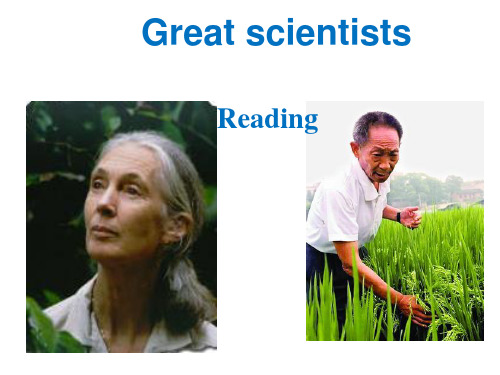
People absorbed it with their meals.
2023/1/25
(3) aiming to kill or destroy 意在杀死的; 不共戴天的: a deadly enemy 不共戴天的敌人 2)deadly adv. (1) very 极度; 非常; 十分 deadly serious 十分认真 (2) like death 死一般地
John Snow was a well-known _d_o_c_to_r_ in London in the _1_9_th__ century. He wanted to find the _c_a_u_s_e_ of cholera in order to _d_e_fe_a_t_ it. In 1854 when a cholera _b_r_o_k_e_ out, he began to gather information.
He _m__a_r_k_e_d__ on a map where all the dead people had lived and he found that many people who had drunk the dirty water from the _p_u_m__p_ died. So he decided that the polluted water carried cholera. He suggested that the _s_o_u_r_ce__ of all water supply be _e_x_a_m__in_e_d__ and new methods of _d_e_a_l_in__g_ with polluted water be found. Finally, “King Cholera” was defeated.
Unit 1《Great scientists》教案2(人教版必修5)

Module 5 Unit 1 Great scientists遂昌中学刘仁海分课时教案Period 1 Warming up, Pre-reading & ReadingTeaching goals:1.To talk about some great scientists and their achievements.2.To develop some basic reading skills.3.To get the general idea of the passage and to relate the passage to stages in a scientific experiment. Teaching procedures:Step one Warming upIntroduce some famous scientists and their achievements, and then do the quiz.There are some great scientific achievements that have changed the world. Can you name some of them? What kind of role do they play in the field of science? Do these achievements have anything in common? Match the inventions with their inventors below before you answer all these questions.Alexander Bell electricityThomas Edison the First telephoneLaite Brothers the electric LampMadame Curie black holes in UniverseFranklin Theory of GravitySteven Hawking the First PlaneElbert Einstein RadiumIsaac Newton the Theory of RelativityStep two Reading1.Pre-reading:1). Pair work : What do you know about infectious diseases?2). Group work: Do you know how to prove a new idea in scientific research? Discuss in small groups the stages in examining a new scientific idea. What order would you put them in?draw a conclusion think of a method collect results make up a questionfind a problem analyse the results find supporting evidence repeat if necessary2. While-reading:1).Predicting:Introduce the title of the passage—John Snow Defeats King Cholera.●What does the title imply?●Predict what the text is about after reading the title and the first paragraph.●Guess what kind of person John Snow was by analyzing the key words in the first paragraph.2). Skimming:●Get the students to read the passage fast . Ask them to pay attention to the first sentence in each paragraph andtry to find several key words to sum up the main idea of the whole passage.●Compare what the students have predicted with the content given by the author.●Read the passage again to get the general idea of each paragraph.Para.1: The causes of cholera.Para.2: The correct or possible theory.Para.3: Collect data on those where people were ill and died and where they got their water. Para.4: Plot information on a map to find out where people died or did not die.Para.5: Analyse the water to see if that is the cause of the illness.Para.6: Find other evidences to confirm his conclusion.Para.7: The polluted dirty source of drinking water was to blame for the cause of the London cholera.3). Scanning:●Read the passage and try to put the correct stages into the reading about research into a disease.A. draw a conclusionB. think of a methodC. collect resultsD. make up a questionE. find a problemF. analyse the resultsG. find supporting evidenceH. repeat if necessaryKeys: E→D→B→C→F→G→A●Answer some detailed questions about the passage and learn some language points:1. Wha t do you know about Dr. John Snow’s being well-known in London?(He attended Queen Victoria to ease the birth of her babies.).e.g. I may be late – I have got one or two things to attend to.Mother had to attend to her sick son .2. From what disease did Londoners suffer in his age?(They exposed themselves to cholera.).e.g. The wolf opened its mouth to expose a row of sharp teeth.Don’t expose your skin to the sun; your skin will be hurt.People in many provinces of China exposed themselves to the SARS in 2003.3. Did people know how to cure the disease?e.g Aspirin is said to be a wonderful cure for the pain.Although the boy was beyond cure, his parents tried to cure him of bad habits.4.When did Dr. Snow think the disease would be controlled?(He knew he would never be controlled until its cause was found.)e.g. The Ministry of Health has set up a program to control the spread of AIDSThe buttons control the temperature in the building5. What was the second theory explaining how the disease killed people?(People absorbed this disease into their bodies with their meals.)be absorbed in = concentrate oneg. He is absorbed in the research of Chinese history recently.absorb one’s attentioneg. Chinese history absorbs his attention recently.5.How serious was the disease outbreak in London?(The cholera outbreak was so severe that more than 500 people had died in 10 days.)e.g. He has such a severe illness that he has been in hospital.I was caught in a severe storm last night and couldn’t go back home in time.7. Did the map which Dr. Snow draw help find the cause of the disease?(The map gave a valuable clue about the cause of the disease.)e.g. -- What is the value of this 18k white gold diamond necklace?-- It cost me $2,000 (=It was worth $2,000.),but I valued the necklace at $1,000.It was a valuable diamond necklace.We never know the value of water till the well is dry.8. Where were many of the deaths in Broad Street?(Many of the deaths were near the water pump in Broad Street.)e.g. If you have a flat tyre, you will pump air into the tyre.We had a debate yesterday. The lively debate really pumped us up.9. Why did some houses have no deaths?(These families worked in the pub at 7 Cambridge Street. They were given free beer and so had not drunkthe water from the Broad street pump.)10. What did Dr. Snow think was responsible for the disease?(It seemed the water was to blame.)e.g. They blamed the secretary for the delay of the plan.The driver was not to blame for the traffic accident.He is ready to take the blame for what had happened.11. What did Dr. Snow advised the people in Broad Street do?(He told the people to remove the handle from the water pump so it could not be used.)12. What else did Dr. Snow find in another part of London that were linked to the Broad Street outbreak?(In addition, he found 2 other deaths.)e.g. The new bridge will link the island to the mainland.Compare: in addition, also, as well as, besidesIn addition to apples you asked for, I bought you some oranges.13. What conclusion did Dr. Snow tell the public?(He announced that polluted water carried the disease.)e.g. The captain announced that the plane was going to land.The army announced a cease-fire.14. What did Dr. Snow tell the water companies?(They were instructed not to expose people to polluted water anymore.)e.g. She instructed me in the use of this telephone.I've been instructed to wait here until the lecturer arrives.3. Post-reading:Work in groups of four and discuss the following questions:1).What should you do if you're traveling to a country that has a cholera outbreak according to Snow’s theory? (Drink only water that you have boiled or treated with chlorine or iodine. Other safe drinks include tea or coffee made with boiled water and carbonated, bottled beverages with no ice. Eat only food that's been thoroughly cooked and is still hot, or fruit that you've peeled yourself. Avoid undercooked or raw fish and shellfish. Avoid raw salads and vegetables. Avoid food and drinks from street vendors.)2.) What spirit can we find in John Snow? As a student, what should we learn from him? Step three ConsolidationListen to the tape and get a better comprehension of the passage. While listening , pay special attention to the new words and expressions as well as the sentence structures they have learned. Step four Homework1.Read the passage aloud after class.2.Prepare for comprehending and learning about language.3.Writing: What I think of John Snow.Period 2 Comprehending & learning about language.Teaching goals:1.To find the scientific report by John Snow and to further understand the passage.2.To get a better understanding of the passage.3.To discover useful words and expressions, structures.Teaching procedures:Step one Revision1.Ask some students to read the text aloud fluently.2.Check the homework exercises.Step two Comprehending1.Fill in the chart after reading the passage.2.Read the passage again and answer these questions.1). Cholera was a 19th century disease. What disease do you think is similar to cholera today?2). John Snow believed Idea 2 was right. How did he finally prove it?3). Do you think John Snow would have solved this problem without the map? Give a reason.Step three Learning about the language1.Discovering useful words and expressions.1)Choose the suitable words or expressions to complete this passage: valuable, instruct, cure, expose, look into, examine, put forward, immediately, announceLi Heping was a famous football player, but his career came to an end when he became very ill. The doctor _________ him but could not find the cause of this illness. He___________ the theory that Li Heping had been _______ to a new virus. He knew he would not be able to ____ him___________, but promised he would ________the possibility of finding one in the future. Sadly, Li Heping __________ that he would take up a new career to _______ footballers in planning for the future. At his last match he thanked his fans for their _______ support by singing the popular song: “Thanks for the memory”.2). Sometimes in English we put the verb make with a noun instead of using a simple verb; for example, make a mistake instead of to mistake. Look at these simple verbs and make another construction using make + a + noun.3). In English verbs like make are very active and useful. Try to remember them and make sentences with the following words.make a face make friends make money make up one’s way to make suremake a decision make up one’s mind make the bed make room for4). This is a report on living conditions in England in the nineteenth century. Choose the correct verb or conjunction to put into the text. Each word may be used only once.link ... to blame expose ... to testdefeat reject absorb examine severe connect…toIn the twenty-first century, educated people find it difficult to believe that living conditions in the nineteenth century ______ people ___ serious illnesses. The reports of many doctors ____illness ___ drinking polluted water. However, one hundred years ago people did not _____a disease ___ the environment. So they did not _____ the companies that supplied dirty water. The doctors found that the dirtier the water, the more ______ the illness. It was only later when people began to ________ the water and ____ its quality that they _______ the idea that cholera was_________ from the air. It was only when everybody began to attack the dirty conditions that cholera was________ and was not a problem any more.2.Discovering useful structures.1). Look at the following sentences where the past participle is used, and find two more examples in thereading passage.Examples: So many thousands of terrified people died. (Attribute)Doctor John Snow was a well-known doctor in London.John Snow told the astonished people in Broad Street.But he became inspired when he thought about helping ordinary people.(Predicative)He got interested in the two theories.Neither its cause, nor its cure was understood.2). Complete the table with phrases that have the same meaning.3). Complete the sentences using the past participle as the predicative.1.He got ______ about losing the money.2.Why do you always look so ____? Do you sleep well these days?3.I was ___________ with the film I saw last night. I had expected it to be better.4.Everybody was ________________ to hear the death of the famous film star.5.The children are really _______ about going to the zoo.6.His wound became _______with a new virus.4). Rewrite the following sentences with the past participle as attributive.1.Let’s try the bookstore that was opened last month.(Let’s try the bookstore opened last mo nth.)2. Nine out of ten women who were interviewed about the product said they liked it.(Nine out of ten women interviewed about the product said they liked it.)3. Yesterday, the President went to visit the workers who had retired.(Yesterday, the President went to visit the retired workers.)Step four Homework1.Go through the grammar items on p89 and finish Using Structures on p44.2.Finish the exercises about using words and expressions on p42.Period 3 Listening and speakingTeaching goals:1.To learn how to get required information by listening.2.Be familiar with some expressions about describing a person’s qualities.3.Practise communicating with their classmates about their futures realistically.Teaching procedures:Step one Listening:1.Lead in: A brief introduction to Fei Junrong and Nie haisheng, and then lead to the famous scientist QianXueshen.2.Explain some new words which will appear in the listening material--astronomer (天文学家), astronaut (宇航员)institute (研究所)then read the questions and ask the students to guess what this passage may be about.3.Listen to the passage twice, then let the students answer these questions.4.Play the tape once again, and check the answers together.Step two Speaking:In pairs discuss what scientific job each of you would like to choose in the future.1.These questions may help you:What job do you want to do?What education will you need? What personality will be needed?How long will the training take?What work experience would be useful?How will you prepare for this career?2.Theses expressions may help you:I always wanted to.. because…I might find it difficult to …My greatest problem will be to …Theexperience I will need is…I need to practise…I will need to be /become: patient, creative, hard-working, co-operative, confident, brave, positive, pleasant, polite, determined, energetic, strict with…3. Let the students practise it in pairs, then ask some of them to give the report.4. Show the slides of the sample conversation.Sample conversation:A : What do you want to do when you grow up?B: I want to build robots. I will have to do a physics and mathematics degree in China. After that I hope to go abroad to Reading University in England where you can study all about robots. There is a special cybernetics(控制论) department there.A: Why personality will be needed for that job?B: They have a lot of uses: for example, in making cars on a production line or doing other repetitive jobs.A: What personality will be needed for that job?B: I think I need to be patient for my ideas will take a long time to develop. I also need to be creative enough to have good ideas.A: What experience will be most useful to you?B: I think technology and engineering projects. I hope to work in a factory in my holidays.A: What kind of person makes a good inventor?B: I think someone who is happy to persevere at something and learns from his mistakes.A: Thank you. I think designing robots sounds fun.Step three Listening. (p.41)1. Some short introduction to this passage and some new words in it. New words in the listening passage:species (种类),parrot (鹦鹉) blackbird (乌鸦)2. Read the questions before listening to the tape.3. Listen to it twice.4. Finish the exercises on p41, then check the answers.5. Show the slides of the reading text and listen again if necessary.Step 4 Homework:1. Do the listening task on P44.2.Writing: What I would like to be in the future.Period 4 Reading, writing and learning tipsTeaching goals:1.To learn about Copernicus’ revolutionary theory.2.To learn to write a persuasive essay and improve their integrating skills .Teaching procedures:Step one Pre-readingWe know the first scientist is Copernicus. He was one of the first scientists to use mathematical observations to collect information. He believed the sun is the center of the universe and the earth and other planets went around it. The chart on P.7 shows his theory.Let’s enjoy a video of Copernicus’ Revolutionary Theory.Step two While-reading1 Skimming:Read through the passage fast and try to get the main idea of the passage.2. Scanning:Scan the passage and find the experiences of CopernicusBirth: February 19, 1473Death: May 24, 1543Place of Birth: Toruń, PolandCareer:1491-1494 Studied mathematics at Kraków Academy1496 Went to Italy to study astronomy and law at the University of Bologna1497 Began observations of the Sun, Moon, and planets1514Wrote Commentariolus, an outline of his astronomical ideas, but did not circulate it widely1543Published De Revolutionibus Orbium Coelestium (On the Revolutions of the Celestial)●Read through the passage again, and tell whether the following statements are true or false.1. At Copernicus’ time, Christian Church was in charge of many western countries.2. Copernicus noticed that observed from the earth, some planets appears in front of or behind the earth.3. Copernicus didn’t show his new theory to his friends until he completed it.4. His friends were not interested in his ideas.5. Since he was not afraid of being attacked by the Church, Copernicus published his book as soon as hefinished working on it.6. Newton, Einstein, and Hawking are all scientists who made contribution to the study of the universe.Step three Explain some language points1. Fill in the blankets with proper words.1) Mao Zedong is the great leader of the Chinese R_________.2) The Invention of the computer caused a r________ in our way of living.3) Sun Zhongsan is a great r___________ leader.4) Yuan Longping created a r___________ new way of growing rice.2. lead to: to result in 导致Your carelessness will lead to the trouble in the future.3. make sense1) to have a clear meaningNo matter how I tried to read it, the sentence didn't make sense.2) to be wise course of actionIt makes sense to take care of your health.4. spin--- spun(span)--- spinninge.g. We span the coin to see who would have first turn.I spun around to see who had spoken.5. If you don’t like Tom, you may r_____ his gift.If you don’t think the suggestion is suitable for you, you may r____ it.6. enthusiastic: be interested inShe’s very ______________________ singing.We explain our plan, and he is very___________.enthusiastic enthusiasm enthusiasticallyShe shows boundless __________ for the work.She greeted him _____________ with a kiss.She is very __________ about Eastern music.7. cautious-- cautiously :careful to avoid riskbe cautious about/of sb./sth.e.g. The bank is very cautious about lending money.My father is a very cautious driver.The guard warned me to be cautious about strangers.Step four DiscussionIf you were Nicolaus Copernicus, would you have hidden your theory for so many years? Give a reason. (Suggested answer:As a scientist, Copernicus was more cautious than coward. If he had published his ideas at his time, he would have been killed just as Bruno who was burnt to death because his theory was against the Christian Church’s. Every time when a new idea appears, there are always rejections. It’s normal. Scientists should have patience to spread their truth..)Step five Writing1. Now write a short letter asking Copernicus to publish his ideas so everyone can read them.2. Learning tips.This article is a persuasive writing, which is about changing somebody else’s point of view. When you are doing this kind of writing, you must always have some evidence to support your idea. To make this easier, you can hold discussions with your family and friends. Give your ideas and reasons to them whenever you are making choices. You may argue with them and try to persuade them. Then you will find it easier to do your persuade writing.However, when you are writing, do not forget to plan your work and put your ideas in a logical order.Now please discuss in a group of four and decide how to write this letter. Try to collect your ideas and make a plan. You can read the tips given to you in Ex.3 on page 7.Here is a plan:Beginning: Tell Copernicus who you are and why you want him to publish his ideas.Paragraph 1: Reason 1 and evidence.Paragraph 2: Reason 2 and evidence.Summing up: Ask him to think again about publishing his ideas.3. Sample writingDear Nicolaus Copernicus,I am a student studying astronomy and I would very much like to read your new theory about the solar system. I hope you will publish it for several reasons.I understand the problems with the present theory. The way the planets move is not what you would expect if the earth was the centre of the universe. It is also odd that the brightness of some stars seems to change. So I agree with you that we need a new theory.I know your observations have been very carefully carried out over many years. Now you must have the courage to publish them. Science can never advance unless people have the courage of their beliefs. I know you worry about what will happen if you publish your new theory.No matter how people oppose it, time will show if your ideas are right or wrong.So I hope you will feel you can publish your new theory.Yours sincerely,(your name)Step six Homework1. Write down your persuasive essay on your exercise books.2. Review the whole unit and prepare for the dictation.Period 5 Summing up & AssessmentTeaching goals:1.To know about what they have learned in this unit.2.To check their work and give a self-assessment.Teaching procedures:Step one Revision1. Have a dictation of the words and expression learned in this unit.scientific conclude repeat defeat attend expose control blame immediately announce complete cautious put forward draw a conclusionin addition link…to apart from lead to make sense point of view2. Translate the following sentences(p42)1) 除了公园以外,这个夏天我就没有出过公寓。
高中英语Unit5 SectionⅠReadingandThinking课件新人教版选择性必修第一册
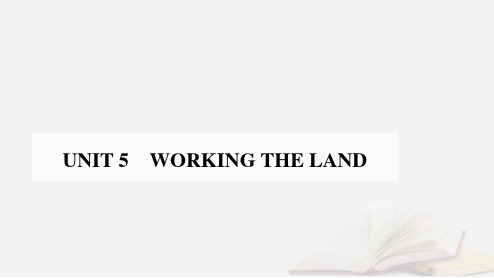
5. The fountain in our school _______three stone basins. 6. Success doesn’t only _______what you do. What you don’t do is equally important. 7. Yet the relationship between growth and the state of the environment is _______ simple. 8. Now when people refer to England you find Wales included _______. 答案: 1. care for 2. Deep down 3. has expanded into 4. has been devoted to 5. is comprised of 6. depend on 7. far from 8. as well
语言知识 文化知识 语言技能
语法
主语从句
语篇 语用
议论文的语篇结构及语言特色
分享观点: I’d rather ... In my opinion ... The advantages are ... It’s a pity that ... My impression is that ... From my point of view, ...
do things you enjoy
D. to become greater in size, number or importance
E. to make sb believe that sth is true
答案:1. D 2. E 3. F
F. to successfully control a feeling or problem
人教版高中英语必修5教师用书:Unit 1 Section_Ⅱ Warming Up - Reading — Language Points (含答案)
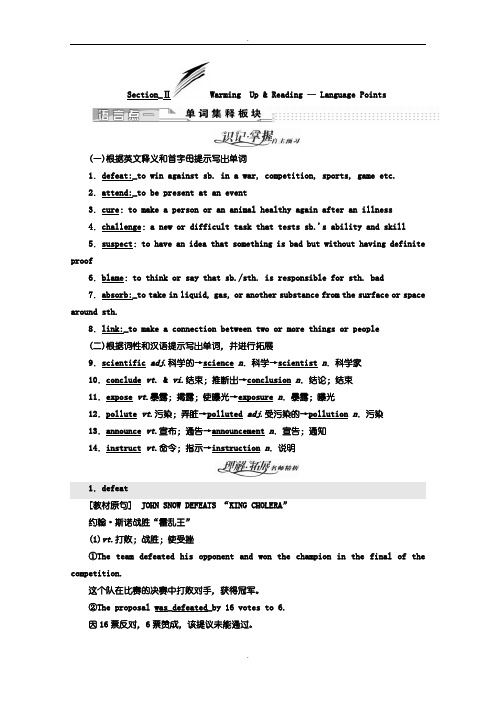
Section_ⅡWarming Up & Reading — Language Points(一)根据英文释义和首字母提示写出单词1.defeat:_to win against sb. in a war, competition, sports, game etc.2.attend:_to be present at an event3.cure:to make a person or an animal healthy again after an illness4.challenge:a new or difficult task that tests sb.'s ability and skill5.suspect:to have an idea that something is bad but without having definite proof6.blame:to think or say that sb./sth. is responsible for sth. bad7.absorb:_to take in liquid, gas, or another substance from the surface or space around sth.8.link:_to make a connection between two or more things or people(二)根据词性和汉语提示写出单词,并进行拓展9.scientific adj.科学的→science n.科学→scientist n.科学家10.conclude vt. & vi.结束;推断出→conclusion n.结论;结束11.expose vt.暴露;揭露;使曝光→exposure n.暴露;曝光12.pollute vt.污染;弄脏→polluted adj.受污染的→pollution n.污染13.announce vt.宣布;通告→announcement n.宣告;通知14.instruct vt.命令;指示→instruction n.说明1.defeat[教材原句] JOHN SNOW DEFEATS “KING CHOLERA”约翰·斯诺战胜“霍乱王”(1)vt.打败;战胜;使受挫①The team defeated his opponent and won the champion in the final of the competition.这个队在比赛的决赛中打败对手,获得冠军。
(完整版)人教版高中英语必修五Unit1知识点详解

必修5 Unit1 Great scientistsPart 1. Warming up1.explain及物动词(vt.)解释;说明;阐明[(+to)][+wh-][+(that)]He explained that he had been cheated. 他解释说他是上当受骗了。
Can you explain how the machine operates?你能解释一下这机器是如何运转的吗?Please explain this rule to me.请给我讲解一下这条规则。
不及物动词(vi.)解释;说明;辩解I've got to explain about it. 我得解释一下此事。
2.characteristicn. 特征;特性Kindness is one of his characteristics.adj. 独特的I heard my friend’s characteristic laugh.be characteristic of sb./sth. 是.....的特性Such bluntness is characteristic of hin. 如此迟钝是他的特性。
3. Who put forward a theory about black holes?put forward 提出(建议等);提名;提前,把时钟往前拨He put forward a new plan. 他提出一个新计划。
May I put your name forward as a possible chairman of the committee?我能否提名你当委员会主席?[归纳拓展]put down 记下;镇压put out 关掉;熄灭put aside 放在一边;储存;保留put off 推迟;延期put up 建造;举起;张贴put on 穿上put away 收好选词填空(put off, put up, put forward, put aside, put out)①The plan that you _____ at the meeting is wonderful.②Many tall buildings were _____ along the road.③Firefighters have been called to _____ the fire in the city center.④He has a little money to _____ for a rainy day.⑤Don’t _____ until tomorrow what can be done today.Part 2. Pre-reading, reading and comprehending1. Do you know how to prove a new idea in scientific researchhow to prove a new idea 为“疑问词+不定式”结构,该结构可在句中作主语、宾语、表语等。
高二英语必修五课文(reading)逐句翻译
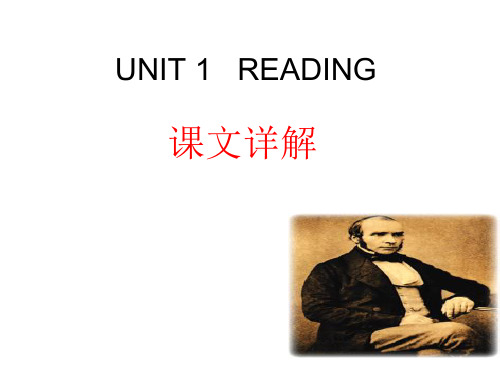
Par 6
1.In another part of London, he found supporting evidence from two other deaths that were linked to the Broad Street outbreak. 在伦敦的另一个地区,他从两个与宽街暴发的霍乱有关联的死亡 病例中发现了有力的证据。 2.A woman, who had moved away from Broad Street, liked the water from the pump so much that she had it delivered to her house every day.有一位妇女是从宽街搬过来的,她特别喜欢那 里的水,每天都要派人从水泵打水运到家里来。 3.Both she and her daughter died of cholera after drinking the water.她和她的女儿喝了这种水,都得了霍乱而死去。 4.With this extra evidence John Snow was able to announce with certainty that polluted water carried the virus.有了这个特别 的证据,约翰· 斯诺就能够肯定地宣布,这种被污染了的水携带着 病菌。
Par 2
1.He became interested in two theories that possibly explained how cholera killed people.斯诺对霍乱致人死地的两种推测都很 感兴趣。 2.The first suggested that cholera multiplied in the air. A cloud of dangerous gas floated around until it found its victims.一种看法 是霍乱病毒在空气中繁殖着,像一股危险的气体到处漂浮,直到 找到病毒的受害者为止。 3.The second suggested that people absorbed this disease into their bodies with their meals.第二种看法是人们在吃饭的时候把 这种病毒引入体内的。 4.From the stomach the disease quickly attacked the body and soon the affected person died.病从胃里发作而迅速殃及全身, 患者就会很快地死去。
人教版必修5unit1Using_language教学设计
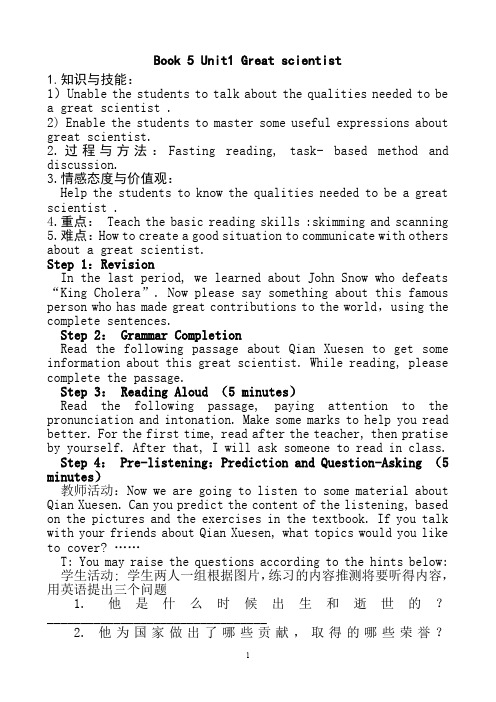
Book 5 Unit1 Great scientist1.知识与技能:1)Unable the students to talk about the qualities needed to bea great scientist .2) Enable the students to master some useful expressions about great scientist.2.过程与方法:Fasting reading, task- based method and discussion.3.情感态度与价值观:Help the students to know the qualities needed to be a great scientist .4.重点: Teach the basic reading skills :skimming and scanning5.难点:How to create a good situation to communicate with others about a great scientist.Step 1:RevisionIn the last period, we learned about John Snow who defeats “King Cholera”. Now please say something about this famous person who has made great contributions to the world,using the complete sentences.Step 2: Grammar CompletionRead the following passage about Qian Xuesen to get some information about this great scientist. While reading, please complete the passage.Step 3: Reading Aloud (5 minutes)Read the following passage, paying attention to the pronunciation and intonation. Make some marks to help you read better. For the first time, read after the teacher, then pratise by yourself. After that, I will ask someone to read in class.Step 4: Pre-listening:Prediction and Question-Asking (5 minutes)教师活动:Now we are going to listen to some material about Qian Xuesen. Can you predict the content of the listening, based on the pictures and the exercises in the textbook. If you talk with your friends about Qian Xuesen, what topics would you like to cover? ……T: You may raise the questions according to the hints below: 学生活动; 学生两人一组根据图片,练习的内容推测将要听得内容,用英语提出三个问题1. 他是什么时候出生和逝世的?_________________________________2. 他为国家做出了哪些贡献,取得的哪些荣誉?___________________3. 他被成为是中国的航天之父,是吗?___________________________Step 5:While-listening: Listening for Detailed Information (5 minutes)Now let’s listen to a conversation between Yu Ping and Steve Smith about Qian Xuesen’s life. Please listen carefully and write down as much information as possible.Step 6.1. Listen to Parts 1 and 2 of the tape for the first time an writedown the main idea. Then fill the following chart.2 Now listen to Part 1 again and answer these questions. 1) What did Qian Xuesen study first?2) What experience did he get in America that was useful for China?3)What was Qian Xuesen’s main achievement when he returned to China?Step 6:Reading and writing COPERNICUS’ REVOLUTIONARY THEORYBrief introductionT:We know the first scientist is Copernicus. He was one of the first scientists to use mathematical observations to collect information. He believed the sun is the center of the universe and the earth and other planets went around it.学生活动:通过老师展示的关于哥白尼的相关信息,学生做出判断,并且回答几个问题。
- 1、下载文档前请自行甄别文档内容的完整性,平台不提供额外的编辑、内容补充、找答案等附加服务。
- 2、"仅部分预览"的文档,不可在线预览部分如存在完整性等问题,可反馈申请退款(可完整预览的文档不适用该条件!)。
- 3、如文档侵犯您的权益,请联系客服反馈,我们会尽快为您处理(人工客服工作时间:9:00-18:30)。
Great Britain
London
Death of first cholera case in London during the 1848-49 epidemic
Germany
3. Look at the picture, the map and the title and predict the content of the reading passage. Then skim it quickly to see if you are right.
I. To prove a new scientific idea, seven stages are needed. Read the text (P2-3) carefully and fill in the blanks.
cause
cure
multiplied
absorbed
prove
map
He is … Archimedes (阿基米德)
Who is he?
Who wrote a book explaining how animals and plants developed as the environment changed?
He is … Charles Darwin.
Who is he?
Alexander Bell Thomas Edison Laite Brothers Madame Curie Franklin Steven Hawking Elbert Einstein Isaac Newton
electricity the First telephone the electric Lamp black holes in Universe
There are some great scientific achievements that have changed the world. Can you name some of them? What kind of role do they play in the field of science? Do these achievements have anything in common? Match the inventions with their inventors below before you answer all these questions.
• Eat only food that’s been thoroughly cooked and is still hot, or fruit that you’ve peeled yourself. • Avoid undercooked or raw fish and shellfish.
• Avoid raw salads and vegetables. • Avoid food and drinks from street vendors.
Find supporting evidence
2. What do you know about infectious diseases? What do you know about cholera?
The spread of cholera
Previous cholera epidemic in Great Britain in 1831-32
source
Many deaths happened here.
Public house
No death happened here.
The water from the pump was to blame.
extra evidence: A woman and her daughter who lived far away but drank the wdartinerkianlgsothdeiewda. ter
Drink only water that you have boiled or treated with chlorine or iodine. Other safe drinks include tea or coffee made with boiled water and carbonated, bottled beverages with no ice.
A. Because it caused many deaths. B.B. Because it got its name from Queen C. Victoria. C. Because it was defeated with the help
of the King. D. Because it was thr for people. C. It could help him organize his ideas and
find evidence. D. It could help him find his way in
Broad Street.
3. Why was cholera called “King Cholera” in the text?
_8__ King Cholera was defeated. _5__ He found that most of the deaths were
near a water pump. _6__ He had the handle removed from the
water pump.
What should you do if you’re travelling to a country that has a cholera outbreak?
Polluted water
examined
I. Choose the best answer. 1. We know from the text that John Snow
______. A. had collected information before
cholera broke out B. felt not quite sure after he finished the
He is … Thomas Edison
Who is he?
Who was the painter that studied dead bodies to improve his painting of people?
He is … Leonardo da Vinci
Who is he?
Who invented a lamp to keep miners safe underground?
map C. helped the woman from Broad
Street D. became famous after defeating
cholera
2. Why did John Snow use a map in his research?
A. It could help him find exactly how B. many people died of cholera. B. It could help him find the source of
"Boil it, cook it, peel it, or forget it."
disease of its day.
I. Number these events in the II. order that they happened. _2__ John Snow began to test two theories. _1__ An outbreak of cholera hit London in
Please put the 7 stages in right order according to the passage.
Draw a conclusion Think of a method
Collect results Make a question Find a problem Analyse the results
Who invented the first steam engine?
He is … Thomas Newcomen.
Who is he?
Who used peas to show how physical characteristics are passed from parents to their children?
He is … Gregor Mendel
Who is he?
Who discovered radium?
She is …
Marie Curie
Who is he?
Who invented the way of giving electricity to everybody in large cities?
John Snow
Read the text (P2-3) quickly and complete the main idea of it.
The text is mainly about _J_o_h_n_ _S_n_o_w__ and how he _d_e_f_e_a_te_d__c_h_o_le_r_a_.
He is … Humphry Davy
Who is he?
Who put forward a theory about black holes?
He is … Stephen Hawking
1. Do you know how to prove a new idea in scientific research? Discuss in small groups the stages in setting out a new scientific idea. What order would you put them in?
